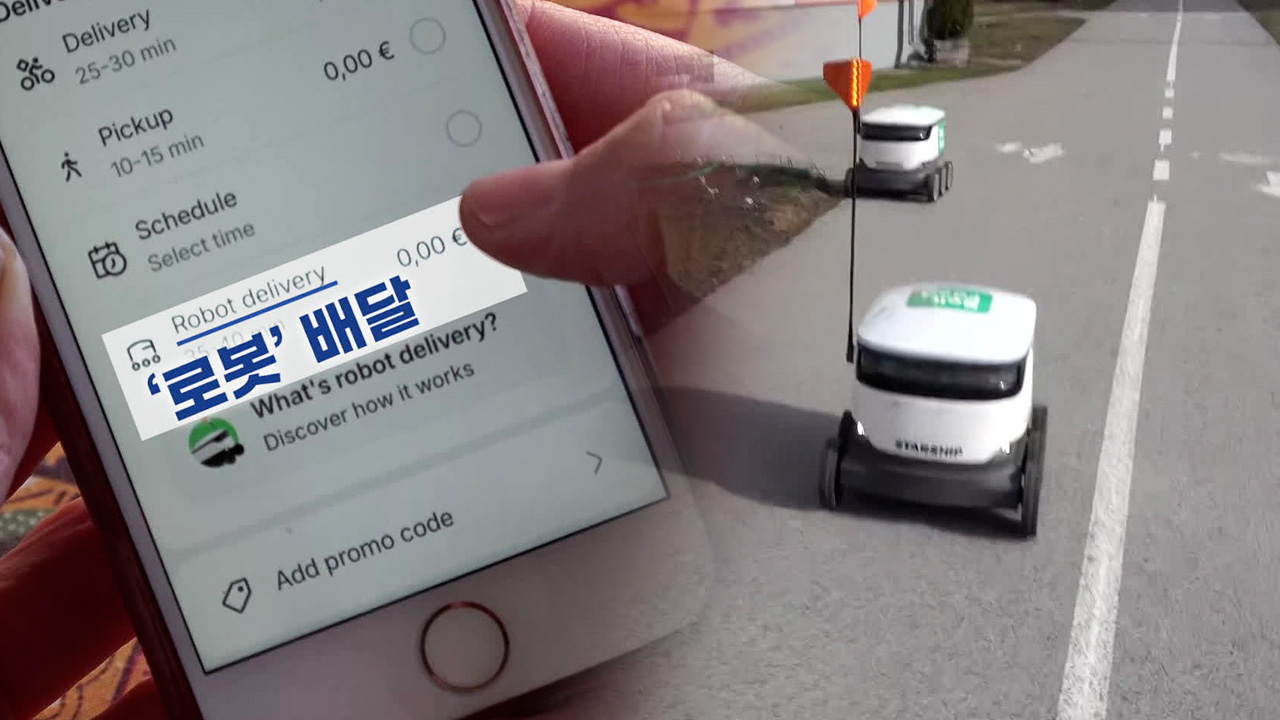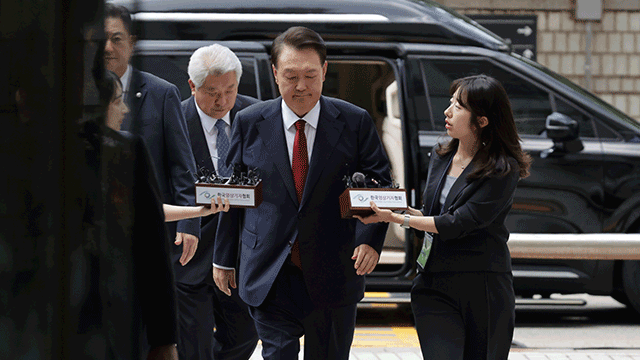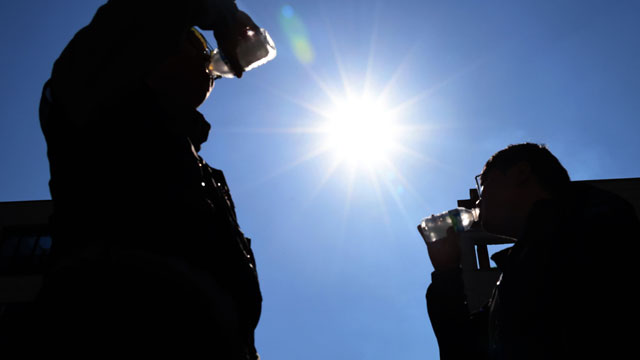[Anchor]
South Korea is considered one of powerhouses in IT, but there are hidden strong players in Europe as well.
When ordering food, a surprise delivery person appears at the door, so let's take a look at that scene first.
This is reporter Lee Hwa-jin.
[Report]
Maris, a housewife in Estonia, orders food using her smartphone as lunchtime approaches.
After selecting bread and bananas, she chooses 'robot delivery,' and once the store employee loads the items into the robot, the delivery to her home is handled by the robot from there.
When someone suddenly blocks the road and attempts to open its lid, a warning sound goes off.
Although it moves at a slow speed of 6 km/h, it carefully recognizes obstacles and road conditions with its 360-degree AI sensors.
[Maris/'Robot Delivery' Customer: "It's very convenient. You can do it without leaving home. I really hate grocery shopping."]
Estonia has produced over ten global unicorn companies with a market capitalization exceeding 1 trillion won, including the world's most frequently recorded delivery service.
In addition to strong government support, student entrepreneurship programs are also a competitive advantage for Estonia.
Twenty-year-old Eliza has already become a startup CEO after developing an eco-friendly air purifier while she was in high school.
[Eliza Region/'MOSSY' CEO: "It was an opportunity to have experience and entrepreneurship without having to face financial risk."]
Dubbed the Silicon Valley of Europe, Estonia's GDP per capita has grown more than 15 times over the past 30 years.
This is KBS News' Lee Hwa-jin in Tallinn.
South Korea is considered one of powerhouses in IT, but there are hidden strong players in Europe as well.
When ordering food, a surprise delivery person appears at the door, so let's take a look at that scene first.
This is reporter Lee Hwa-jin.
[Report]
Maris, a housewife in Estonia, orders food using her smartphone as lunchtime approaches.
After selecting bread and bananas, she chooses 'robot delivery,' and once the store employee loads the items into the robot, the delivery to her home is handled by the robot from there.
When someone suddenly blocks the road and attempts to open its lid, a warning sound goes off.
Although it moves at a slow speed of 6 km/h, it carefully recognizes obstacles and road conditions with its 360-degree AI sensors.
[Maris/'Robot Delivery' Customer: "It's very convenient. You can do it without leaving home. I really hate grocery shopping."]
Estonia has produced over ten global unicorn companies with a market capitalization exceeding 1 trillion won, including the world's most frequently recorded delivery service.
In addition to strong government support, student entrepreneurship programs are also a competitive advantage for Estonia.
Twenty-year-old Eliza has already become a startup CEO after developing an eco-friendly air purifier while she was in high school.
[Eliza Region/'MOSSY' CEO: "It was an opportunity to have experience and entrepreneurship without having to face financial risk."]
Dubbed the Silicon Valley of Europe, Estonia's GDP per capita has grown more than 15 times over the past 30 years.
This is KBS News' Lee Hwa-jin in Tallinn.
■ 제보하기
▷ 카카오톡 : 'KBS제보' 검색, 채널 추가
▷ 전화 : 02-781-1234, 4444
▷ 이메일 : kbs1234@kbs.co.kr
▷ 유튜브, 네이버, 카카오에서도 KBS뉴스를 구독해주세요!
- Estonia: Hidden IT powerhouse
-
- 입력 2025-04-13 03:34:31

[Anchor]
South Korea is considered one of powerhouses in IT, but there are hidden strong players in Europe as well.
When ordering food, a surprise delivery person appears at the door, so let's take a look at that scene first.
This is reporter Lee Hwa-jin.
[Report]
Maris, a housewife in Estonia, orders food using her smartphone as lunchtime approaches.
After selecting bread and bananas, she chooses 'robot delivery,' and once the store employee loads the items into the robot, the delivery to her home is handled by the robot from there.
When someone suddenly blocks the road and attempts to open its lid, a warning sound goes off.
Although it moves at a slow speed of 6 km/h, it carefully recognizes obstacles and road conditions with its 360-degree AI sensors.
[Maris/'Robot Delivery' Customer: "It's very convenient. You can do it without leaving home. I really hate grocery shopping."]
Estonia has produced over ten global unicorn companies with a market capitalization exceeding 1 trillion won, including the world's most frequently recorded delivery service.
In addition to strong government support, student entrepreneurship programs are also a competitive advantage for Estonia.
Twenty-year-old Eliza has already become a startup CEO after developing an eco-friendly air purifier while she was in high school.
[Eliza Region/'MOSSY' CEO: "It was an opportunity to have experience and entrepreneurship without having to face financial risk."]
Dubbed the Silicon Valley of Europe, Estonia's GDP per capita has grown more than 15 times over the past 30 years.
This is KBS News' Lee Hwa-jin in Tallinn.
South Korea is considered one of powerhouses in IT, but there are hidden strong players in Europe as well.
When ordering food, a surprise delivery person appears at the door, so let's take a look at that scene first.
This is reporter Lee Hwa-jin.
[Report]
Maris, a housewife in Estonia, orders food using her smartphone as lunchtime approaches.
After selecting bread and bananas, she chooses 'robot delivery,' and once the store employee loads the items into the robot, the delivery to her home is handled by the robot from there.
When someone suddenly blocks the road and attempts to open its lid, a warning sound goes off.
Although it moves at a slow speed of 6 km/h, it carefully recognizes obstacles and road conditions with its 360-degree AI sensors.
[Maris/'Robot Delivery' Customer: "It's very convenient. You can do it without leaving home. I really hate grocery shopping."]
Estonia has produced over ten global unicorn companies with a market capitalization exceeding 1 trillion won, including the world's most frequently recorded delivery service.
In addition to strong government support, student entrepreneurship programs are also a competitive advantage for Estonia.
Twenty-year-old Eliza has already become a startup CEO after developing an eco-friendly air purifier while she was in high school.
[Eliza Region/'MOSSY' CEO: "It was an opportunity to have experience and entrepreneurship without having to face financial risk."]
Dubbed the Silicon Valley of Europe, Estonia's GDP per capita has grown more than 15 times over the past 30 years.
This is KBS News' Lee Hwa-jin in Tallinn.
-
-

이화진 기자 hosky@kbs.co.kr
이화진 기자의 기사 모음
-
이 기사가 좋으셨다면
-
좋아요
0
-
응원해요
0
-
후속 원해요
0















이 기사에 대한 의견을 남겨주세요.